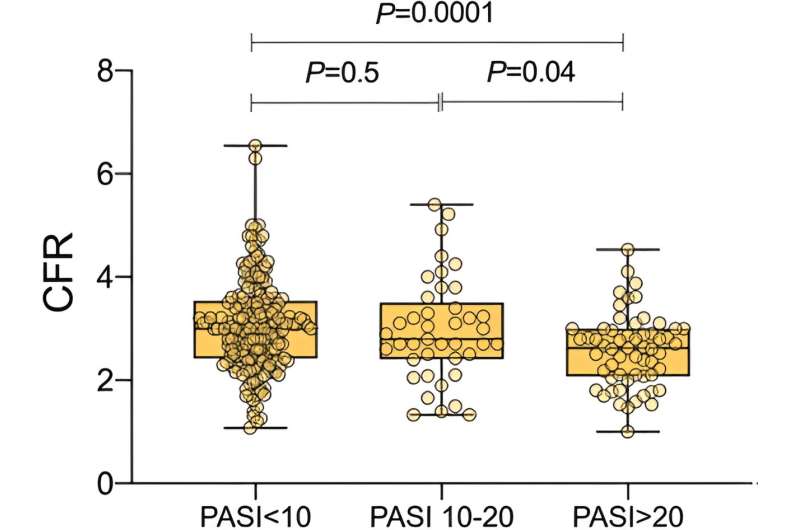This article has been reviewed according to Science X's editorial process and policies. Editors have highlighted the following attributes while ensuring the content's credibility:
fact-checked
peer-reviewed publication
trusted source
proofread
New evidence confirms patients with severe psoriasis are at a higher risk for heart disease

In the largest study to date exploring the relationship between severe psoriasis and coronary microvascular dysfunction, researchers have found further evidence that patients with severe psoriasis are at higher cardiovascular risk. The results are published in the Journal of Investigative Dermatology.
Psoriasis is a chronic systemic immune-mediated inflammatory disease that affects 1–3% of the global population. In this study, a total of 503 patients with psoriasis, and without clinical cardiovascular disease, underwent transthoracic Doppler echocardiography to evaluate coronary microcirculation. Investigators uncovered a high prevalence of coronary microvascular dysfunction in more than 30% of asymptomatic patients within the study population.
Lead investigator Stefano Piaserico, MD, Ph.D., Dermatology Unit, Department of Medicine, University of Padova, explained, "Previous studies have shown that patients with severe psoriasis have an increased cardiovascular morbidity and mortality. However, there has been limited research on the specific mechanisms underlying this increased risk, particularly regarding coronary microvascular dysfunction.
"We wanted to further investigate the prevalence of coronary microvascular dysfunction, as assessed by coronary flow reserve (CFR), in a large cohort of patients with severe psoriasis and its association with psoriasis severity and duration, as well as other patient characteristics. Patients with a reduced CFR underwent angio-CT to exclude a stenosis of the coronary arteries, and no patients showed coronary artery disease. Therefore, all patients with an impaired CFR in our cohort were affected by coronary microvascular dysfunction."
The study revealed that psoriasis severity—assessed by the Psoriasis Area Severity Index (PASI) score—and the duration of the disease were independently associated with lower CFR, along with the presence of psoriatic arthritis. Furthermore, results from the study showed that conventional cardiovascular risk factors, such as tobacco use, hyperlipidemia, and diabetes mellitus, were not independently associated with reduced CFR in patients with severe psoriasis. These findings emphasize the importance of considering inflammation and psoriasis-related factors in assessing cardiovascular risk in patients with severe psoriasis.
The findings shed light on the potential mechanism by which psoriasis increases the risk of cardiovascular complications in affected individuals, in agreement with previous studies on chronic inflammatory conditions, such as rheumatoid arthritis, systemic lupus erythematosus and systemic sclerosis. The study supports the role of systemic inflammation in the development of coronary microvascular dysfunction.
Dr. Piaserico commented, "We should diagnose and actively search for microvascular dysfunction in patients with psoriasis, as this population is at particularly high risk. We might hypothesize that an early and effective treatment of psoriasis would restore the dysfunction and eventually prevent the future risk of myocardial infarction and heart failure associated with it.
"In keeping with this, some preliminary studies showed that coronary microvascular dysfunction is restored after a treatment with biologics. Nevertheless, prospective studies are needed to confirm whether these findings translate into reductions in cardiovascular events."
More information: Coronary Microvascular Dysfunction in Asymptomatic Patients with Severe Psoriasis, Journal of Investigative Dermatology (2023). DOI: 10.1016/j.jid.2023.02.037





















